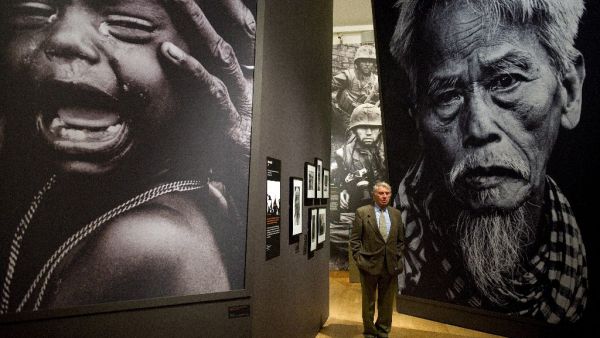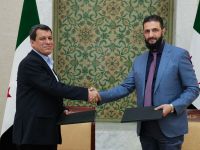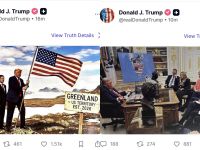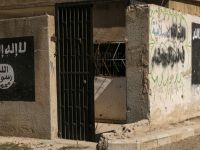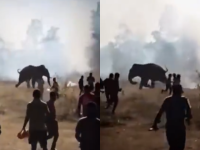Sir Don McCullin needs little introduction. Over a 50-year period torn by conflict - including in Cyprus, Vietnam, Northern Ireland and Lebanon - he has been responsible for some of the most resonant photos. McCullin first came to Beirut in 1965, he said, to work with Palestinian refugees. During the Civil War, he witnessed such events as the 1976 Karantina massacre and the 1982 Israeli invasion. In Sabra, he photographed the aftermath of the bombing of the Dar al-Ajaza al-Islamia hospital, whose patients included mentally ill and disabled children and geriatrics.
Some of his best-known wartime images include one of Phalangist fighters in the chandeliered foyer of the Holiday Inn in 1976. Another, capturing a group of celebrating militiamen in Karantina, got him put on a Phalange hit list. He has published many photo books, including “Beirut, a City in Crisis,” from 1983.
At the Beirut Art Fair Thursday afternoon, McCullin held his audience rapt with an overview of his life’s work, including photos of historic sites in Baalbeck and Palmyra.
An hour before his talk, McCullin lost a tooth. Unfazed, the 84-year-old spoke for a full hour, took questions, signed books and sat with The Daily Star. Then he went to the dentist.
At Beit Chebab Friday, he led art fair VIPs through two short tours of a stunning (VIP-only) exhibition of almost 50 photos from the Civil War, plus three from Baalbeck, all from Philippe Jabre’s collection.
“I seem to have made more of a collection on Lebanon than I realized,” McCullin quipped. “Philippe’s got more pictures than I have.”
“I think it’s quite extraordinary that Philippe has gone to the trouble to accumulate this collection of my work,” he told the large group.
“It’s his good idea, to say, ‘This is important history for Lebanon.’ It’s history you don’t want to remember too much, but it did take place and it’s incredibly important that you have documentation.”
McCullin’s remarks to The Daily Star have been edited for brevity.
Q: Do you have anything on your agenda in this region aside from your BAF activities?
A: We’ve just come from Turkey where we’ve been doing a lot of Roman sites for a magazine. We’re doing some more Roman things [in Lebanon]. It’s one of my great passions. It’s the last chapter probably in my working life. My body’s breaking down, my legs, my feet, my hands. I had a big heart operation. So I’m struggling all the time against some physical [issues]. It’s a really big individual battle because I need my energy. [When] I come out of my darkroom, I’m starting to cough now. It means that the chemistry is finally getting to my lungs. I’m paying quite a heavy price for loving my work.
Q: How does it feel to have been witness to so many crucial moments in history?
A: I can’t believe a little boy from north London who came from a very poor family and no father was given this privilege on a plate. I must have deserved it. [He laughs.] I’ve always been humble about my life and I don’t go around bragging. In the end I can’t wear the laurels comfortably. I can’t tell you the amount of times I nearly got killed. That’s another thing that scares me, the fact that I’m still alive. Maybe I was a good messenger.
{"preview_thumbnail":"https://cdn.flowplayer.com/6684a05f-6468-4ecd-87d5-a748773282a3/i/v-i-b…","video_id":"b893d5d5-cfb1-4156-af50-0c298b613a2a","player_id":"8ca46225-42a2-4245-9c20-7850ae937431","provider":"flowplayer","video":"UN Welcomes Proposal by Yemen’s Houthi to Halt Strikes on Saudi Arabia"}
Q: Some local photographers who worked in the Lebanese Civil War have expressed some resentment of foreign photographers, who were seen as more important, maybe had expensive equipment. Did you have a lot to do with local photographers while you were here?
A: I just came here as a simple photographer. I didn’t have any backup. I didn’t expect any privilege. You risk your life here, so I don’t know why they resented us. I didn’t come here to win any prizes. I came here to shoot pictures and do my job. I got paid the same amount of money as the photographers who’d never left England. I belong to the National Union of Journalists, so I wasn’t being super paid or anything. I was just another guy.
The local photographers, they hadn’t had the [front-line] experience that people like me had, but I never worked with any. I used to take myself completely away from the gang of press and worked completely alone. All the best work I did in my life, I was completely alone. I saw some of the foreign press coming here, mostly television people, behaving badly. They thought they were the gods of media. They weren’t. Particularly American television crews, they came to that hospital [in Sabra] eventually and were treading on the kids and knocking people about. It was terrible. They kept saying, “It’s prime time in America.”
Q: How do you think photography, particularly in conflict zones, has changed as a ‘mission’ over the years and where do you think it’s going?
A: It’s going nowhere because the Americans introduced embedded [photographers]. There’s so much censorship now - that’s what it is, embedded [photography], it’s censorship. It’s keeping an eye on you. It’s stopping you seeing the truth. People who own and control media, they’re not doing their job. They’re [just] money-making. They’re only interested in the narcissistic world of glamour, beauty and all the privileged people who are good at football. I’m very disappointed with media. Media in the end will disappear because everybody knows the print journalism will disappear one day. It’s all going to go into these things here [cellphones].
Q: What do you think about the younger generations of photojournalists and conflict photographers? Have you seen a shift in attitudes in the profession?
A: The trouble with photography is, it’s slightly usurping itself by trying to get into the art world so they can jack up the price, jack up the fame. Photojournalism is on its way out, dead, if you don’t mind me saying so. Where are they going to publish if these people [media owners] won’t publish that kind of [photojournalism] work? That’s the very short, quick answer. There is not a great deal of future. Photography’s also taken another turn. It’s become weak and for me it’s what I would call tripe. It’s not great photography. It’s not powerful photography, because they’re nudging up to the art world. They photograph the most banal, useless things that don’t say anything, are not powerful. It almost looks amateurish because they’re trying to dumb down and call it art. It’s not art at all.
Q: Why have you always stayed away from big photo agencies?
A: I used to be with Magnum for one year and I decided I didn’t want to be with a gang of people. I’ve always been a one-man band loner. I think I made the right decision, really. When I first went to the war in Cyprus there were [less than] three dozen journalists. When I went to one of the big wars in Iraq, there were 2,000. How can you work with 2,000 people? You have to control 2,000 people on the battlefield because they’re going to get in the way of your military behavior. My timing was great. It [photography] came to me. I was given this opportunity. I took it, and its time has passed now. It’s gone. I wouldn’t want to start again now as a photographer.
This article has been adapted from its original source.


